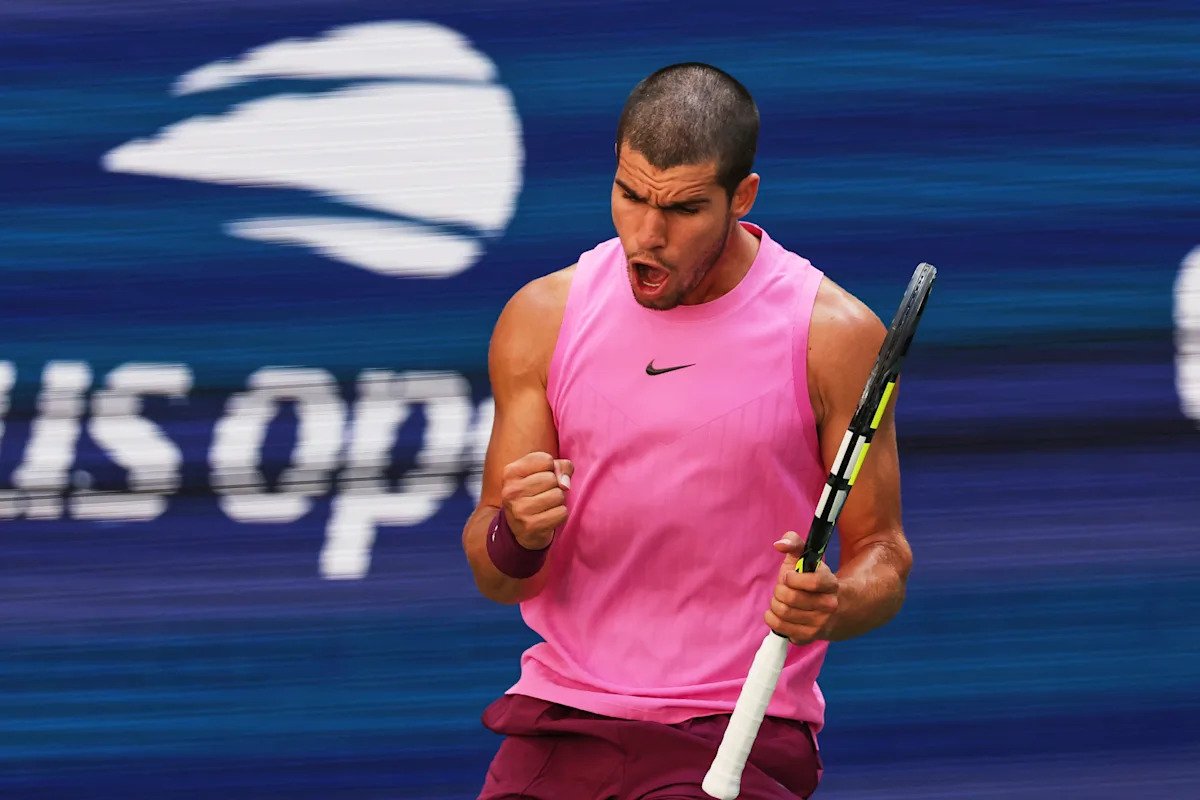NEW YORK — In the tennis metric that matters most historically, Carlos Alcaraz has already put together a career eclipsing the likes of Andy Murray, Stan Wawrinka and Jim Courier while nipping at the heels of Boris Becker and Stefan Edberg. And yet, even with five Grand Slam titles, the 22-year old Alcaraz arrived at this US Open as an entity not yet fully formed.
It wasn’t just Alcaraz’s age that gave rise to the notion his game wasn’t as mature as his résumé. It was the obvious moments of inconsistency, the dips in focus during matches and the lack of clarity in his decision-making, none of which had impacted him much — except against one opponent.
But if Alcaraz’s relative struggles against Novak Djokovic represented the gap between where he was and where he has the potential to go, Friday’s semifinal was a different mile marker.
The relationship between master and ingenue has changed. Alcaraz’s only competition in this matchup is himself, and in their ninth career meeting it finally became a blowout.
Alcaraz’s 6-4, 7-6 (4), 6-2 victory won’t look like a breakthrough in the history books for a player who will spend the next decade trying to rewrite them. But by making the US Open final without dropping a set — and bullying his way through Djokovic on a day he didn’t have his A-plus stuff — the Spaniard unlocked a new level of his greatness.
For an all-time talent who still hasn’t come close to his prime, the training wheels are finally off.
”It’s something I’m working on, and that’s the consistency in the matches and tournaments, just not having ups and downs,” Alcaraz said. “The level that I start a match, I want to keep that level really high during the whole match. I think I’m doing that in this tournament, which I’m really proud about.”
Alcaraz’s near-pristine form in this US Open does not mean he’s a lock to win this title Sunday for the second time in his career. If No. 1 Jannik Sinner takes care of business in Friday night’s second semifinal against Felix Auger-Aliassime, it will set up the third straight Grand Slam final between them in a rivalry that looks more like a coin flip.
But here’s why it’s so important that Alcaraz finished off Djokovic the way he did Friday.
Over the past two years, we’ve seen plenty of Alcaraz’s high end. That’s how he’s won two Wimbledons, two French Opens and a US Open in the first 18 majors of his career along with eight Masters 1000-level tournaments.
The problems, such as they are, were entirely related to the consistency and maturity with which he approaches the job on a day-to-day, even sometimes point-to-point basis. Like so many genius entertainers, the desire to show off his entire array of skills did not always serve him well on days when he simply needed to get the job done.
”Just getting mature, getting to know myself much better and what I need off the court,” Alcaraz said. “I think I’m doing really well off the court to help a lot to play the best tennis. I realize how important it is.”
Aside from last year’s Wimbledon final when Alcaraz took advantage of a Djokovic, who was just weeks removed from knee surgery, those impulses have been most apparent in this matchup.
From Djokovic’s 5-7, 7-6, 7-6 win in the 2023 Cincinnati final — arguably one of the best matches ever played outside of the majors — to last summer’s Olympic gold medal bout, it was very apparent that being older and more disciplined was the X-factor to get Alcaraz off his game.
By the time they met in this year’s Australian Open quarterfinal, Djokovic was in his head. Alcaraz couldn’t get into a full flow, approaching each shot with an edginess as if the entire history of their rivalry had been downloaded into his mind.
And so a narrative formed: Sinner was the machine-like winner; Alcaraz the high-wire act who could either blast into the heavens or self-combust on the spot.
But in between leaving Australia and walking of the court Friday, he’s proven it untrue.
Carlos Alcaraz greets Novak Djokovic following their semifinal match at the US Open. (Clive Brunskill/Getty Images)
Dating back to the Monte-Carlo Masters in April, Alcaraz has now made the finals in his last eight tournaments. If he wins Sunday, it would be his sixth title over that stretch. How’s that for consistency?
At various points in the past couple years, other players on tour could hope Alcaraz would succumb to immaturity and open a glide path to a Grand Slam final. But now, even Djokovic has to admit that’s unlikely outside of an injury.
“It’s expected that the young guys are improving,” he said. “These two players [Sinner and Alcaraz] are the best in the world right now, and if you’re not improving then something isn’t right. There is no doubt they are better and better each year.”
If you were looking for confirmation of Alcaraz’s growth, this match was the proof of concept.
Outside of a 10-minute stretch at the beginning of the second set when he unnecessarily dumped a service game, Alcaraz was all business. No, he wasn’t perfect or as sharp as he had been for most of this US Open, admitting in the post-match interview that his level was lower than in previous rounds when he effortlessly dusted opponents off the court.
But that’s what the dominant players do.
They win without their best. They eventually render the guile of their older rivals meaningless. They turn the most expensive day session ticket in US Open history into a bust. They show us in real time what it looks like to climb the ladder of all-time greats.
Source link
#Carlos #Alcaraz #inches #perfection #ousting #Novak #Djokovic #reach #final
